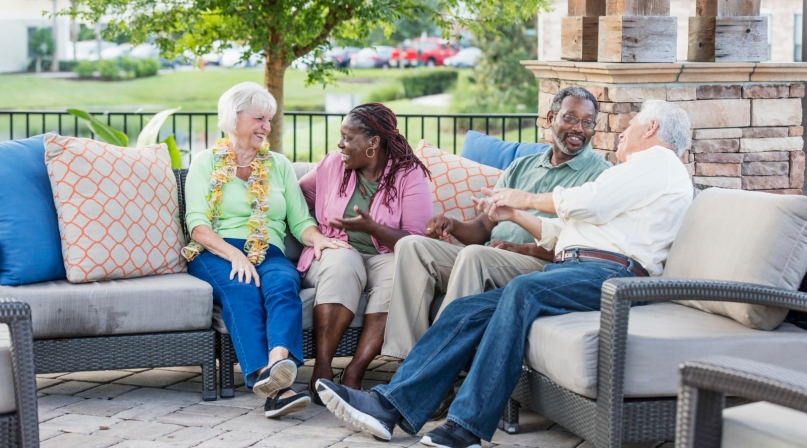How counties can help create ‘Livable Communities’
Upcoming Events
Related News

Key Takeaways
Approximately 45 million Americans are now age 65 or older. By 2030, 73 million, or one in five adults, will be older than 65. In fact, by 2035, the United States will — for the first time ever — be a country comprised of more older adults than children. The vast majority of people age 50 or older are highly engaged in their communities and want to live in their homes and communities for as long as possible.
We all know that well-designed, livable communities promote and sustain economic growth and make for happier, healthier residents. And we also know that local leaders are best positioned to turn their communities into great places for people of all ages.
Those realities are just a few of the reasons why AARP staff members and volunteers are working with elected officials, local governments and residents in communities throughout the nation to help make towns, cities, counties and even states more livable and age-friendly for people of all ages.
AARP’s goal — in collaboration with national, state and local partners — is to create great places where people can live their best lives at every age. We seek to create more livable communities where myriad transportation choices exist — including for those who cannot or choose not to drive — and a range of affordable and accessible housing options exist for people at every stage of life. We strive to support the creation of parks and public spaces that are engaging, inclusive, safe, and welcoming, and which can serve as a hub for public life for people across generations.
In partnership with our AARP state offices (there is one in every state, plus DC, USVI and Puerto Rico — find yours at AARP.org/States), the AARP Livable Communities initiative serves as a resource for programs, information, tools and grants that support practitioners, and bring best practices and solutions to those on the front lines of creating great communities.
- More than 400 communities — and seven states — have already joined the AARP Network of Age-Friendly States and Communities which facilitates a multi-year, locally driven, action-oriented process that results in more livable communities. (Check out the member list to see which communities have already joined at AARP.org/AgeFriendly).
- Since its debut in 2017, the AARP Community Challenge grant program has awarded more than $3.5 million in funding to more than 300 projects nationwide. These grants help towns, cities, counties and neighborhoods make immediate improvements and jumpstart long-term change through quick-action grants.
Challenge grant funds have been used to build accessible “tiny houses” for older adults; install artistic crosswalks, murals, benches and directional signage; transform underutilized public spaces and more. The annual application period opens in February; learn more at AARP.org/CommunityChallenge.
- Our website and weekly newsletter provide information and lessons from around the country to community “influencers” — elected officials, planners, municipal staff, placemaking pros, local leaders, policy makers, citizen activists and residents — to help them affect local change. Subscribe to the free, award-winning newsletter at AARP.org/LivableSubscribe or explore our feature articles, interviews and news at AARP.org/Livable.
- Free print publications on topics ranging from how to conduct a walk audit, to understanding how ADUs fit in a livable community, to tools on assessing how to improve your parks are available for download or in print. Check out the ever-growing collection at AARP.org/LivableLibrary.
- Just starting out? Learn how livable your county, town or neighborhood is through AARP’s free interactive, data-driven tool: The Livability Index. Developed by the AARP Public Policy Institute, the index tracks dozens of policies and indicators to calculate the livability of a state, county, town, city or street. Find a score by entering an address, ZIP code, municipality or location name at AARP.org/LivabilityIndex.
Consider AARP your partner when exploring how to prepare your county for a more age-friendly and livable future for all. The nonprofit, nonpartisan advocacy organization for people age 50 or older is working to improve communities for people of all ages.

Attachments
Related News

U.S. Congress begins work on budget reconciliation process: What this means for counties
The House and Senate Budget Committees have marked up Fiscal Year (FY) 2025 budget resolutions to initiate the budget reconciliation process to enact policy priorities without garnering bipartisan support, although the two chambers differ in their approach to drafting the legislation.
Panel: People in crisis need support, not handcuffs
Counties can better serve people experiencing a behavioral health crisis by engaging behavioral health specialists instead of law enforcement, experts told county officials at a recent meeting held at NACo headquarters.

Lawmakers reintroduce the Build Housing with Care Act
On January 30, Senator Ron Wyden and Congresswoman Bonamici reintroduced the Build Housing with Care Act. This legislation would establish a new competitive grant program under HUD intended to boost the supply of co-located child care facilities and affordable housing developments.